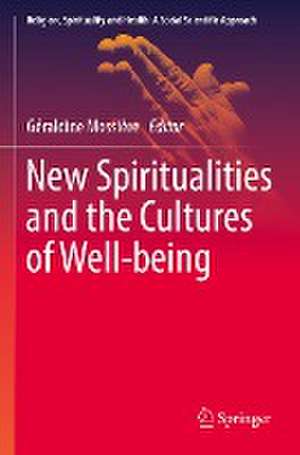New Spiritualities and the Cultures of Well-being: Religion, Spirituality and Health: A Social Scientific Approach, cartea 6
Editat de Géraldine Mossièreen Limba Engleză Paperback – 8 iul 2023
Part I provides theoretical insights for thinking about ways in which the prevalent ethics of well-being reframes subjectivities within the margins of neoliberal order. Part II demonstrates how spiritual economies are promoted, shaped and regulated by institutional forces such as States, law and the labor market. In part III, contributors describein detail how spiritual economies unfold in specific cultural and social settings. The text appeals to students and researchers working on the spirituality and sociology of religion.
| Toate formatele și edițiile | Preț | Express |
|---|---|---|
| Paperback (1) | 885.18 lei 43-57 zile | |
| Springer International Publishing – 8 iul 2023 | 885.18 lei 43-57 zile | |
| Hardback (1) | 891.17 lei 43-57 zile | |
| Springer International Publishing – 7 iul 2022 | 891.17 lei 43-57 zile |
Preț: 885.18 lei
Preț vechi: 1079.48 lei
-18% Nou
Puncte Express: 1328
Preț estimativ în valută:
169.38€ • 177.29$ • 140.98£
169.38€ • 177.29$ • 140.98£
Carte tipărită la comandă
Livrare economică 31 martie-14 aprilie
Preluare comenzi: 021 569.72.76
Specificații
ISBN-13: 9783031062650
ISBN-10: 3031062655
Ilustrații: VI, 184 p. 1 illus.
Dimensiuni: 155 x 235 mm
Greutate: 0.28 kg
Ediția:1st ed. 2022
Editura: Springer International Publishing
Colecția Springer
Seria Religion, Spirituality and Health: A Social Scientific Approach
Locul publicării:Cham, Switzerland
ISBN-10: 3031062655
Ilustrații: VI, 184 p. 1 illus.
Dimensiuni: 155 x 235 mm
Greutate: 0.28 kg
Ediția:1st ed. 2022
Editura: Springer International Publishing
Colecția Springer
Seria Religion, Spirituality and Health: A Social Scientific Approach
Locul publicării:Cham, Switzerland
Cuprins
Introduction: Spiritual economies and the ethics of well-being.- Section 1: Ethics of well-being and the spiritual subject.- Chapter 1. Discovering a True Self and Experiencing Uncertain Subjectivity. Gap and Contradiction between conceptions of the Modern Subject in New Spiritualties.- Chapter 2. Personal Development Discourse and the Culture of Well-Being: The Secular Wing of the Spiritual Turn.- Chapter 3. Well-being and virtuous life among converts : how spiritual coaching delineate relational subjectivities.- Section 2: Institutionalization and (de)regulation of spiritualities and good life.- Chapter 4. Smudging, Yoga and Ethical Veganism: Exploring the Boundaries of Religious and Spiritual Practice in Law.- Chapter 5. Iran from the 1990s: Economic reforms and spiritual transformations?.- Chapter 6. When Spirituality Becomes Spiritual Labor: Workplace Mindfulness as Practice of Well-being and Productivity.- Chapter 7. The Ethics of Paying Attention: Nature Connection as SubjectiveActivism.- Section 3: New spiritualities and the social construction of the good life.- Chapter 8. The Entanglement of Spirituality, Wellbeing and ‘Spiritual Economy’ in Brazil: The Shift from ‘Living well together’ to ‘Leading a good life’.- Chapter 9. The institutionalization of Spiritual Healing in West Africa: The Emergence of Roqya Clinics in Ivory Coast.- Chapter 10. The Land of Tomorrow: Nature and the Curation of the Self on the West Coast.- Chapter 11. Well-being in Neo-spiritual Dance Practice.- Chapter 12. Circles of «sacred femininity» in Russia: balancing between tradition and innovation in working on self.- Index.
Notă biografică
Geraldine Mossiere is an anthropologist and associate professor at the Université de Montreal’s Institute of Religious Studies. Her more than fifty professional publications address contemporary religiosities including religious diversity in secular societies and the growing trend toward spirituality discourse. She has also published and edited numerous books and special reviews on conversion processes and experiences (see Converties à l'islam. Parcours de femmes au Québec et en France, Presses de l’Université de Montréal, 2013). She now works on the healing dimension of spiritualities as well as spirituality in public institutions.
Textul de pe ultima copertă
Inspired by the neoliberal paradigm that transposes religious behaviors into a religious marketplace framed by consumerist and capitalist models, this volume draws on ethnographic fieldwork to discuss the assemblage between the well-being trope and the rise of new spiritualities, as well as their deep permeation within mainstream culture. Building on previous literature that addresses the relationship between spirituality, healing and well-being, this text discusses the religious roots of mind-body practices. The contributions offer a critical perspective on the scope, limits and impacts of the current celebration of spiritualities.
Part I provides theoretical insights for thinking about ways in which the prevalent ethics of well-being reframes subjectivities within the margins of neoliberal order. Part II demonstrates how spiritual economies are promoted, shaped and regulated by institutional forces such as States, law and the labor market. In part III, contributors describein detail how spiritual economies unfold in specific cultural and social settings. The text appeals to students and researchers working on the spirituality and sociology of religion.
Part I provides theoretical insights for thinking about ways in which the prevalent ethics of well-being reframes subjectivities within the margins of neoliberal order. Part II demonstrates how spiritual economies are promoted, shaped and regulated by institutional forces such as States, law and the labor market. In part III, contributors describein detail how spiritual economies unfold in specific cultural and social settings. The text appeals to students and researchers working on the spirituality and sociology of religion.
Caracteristici
Brings together a group of top scholars in questioning the relationship between spirituality and well-being in light of empirical data Uniquely covers the issue of spirituality from a critical, anthropologically informed perspective Compares the growing trend toward spirituality against the neoliberal paradigm






